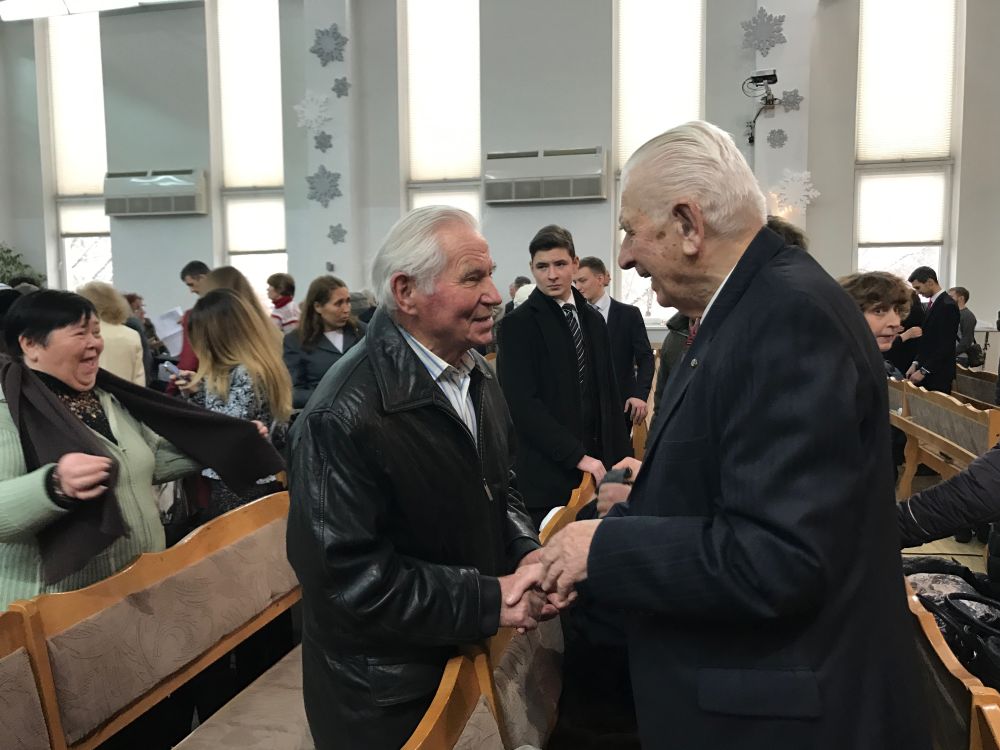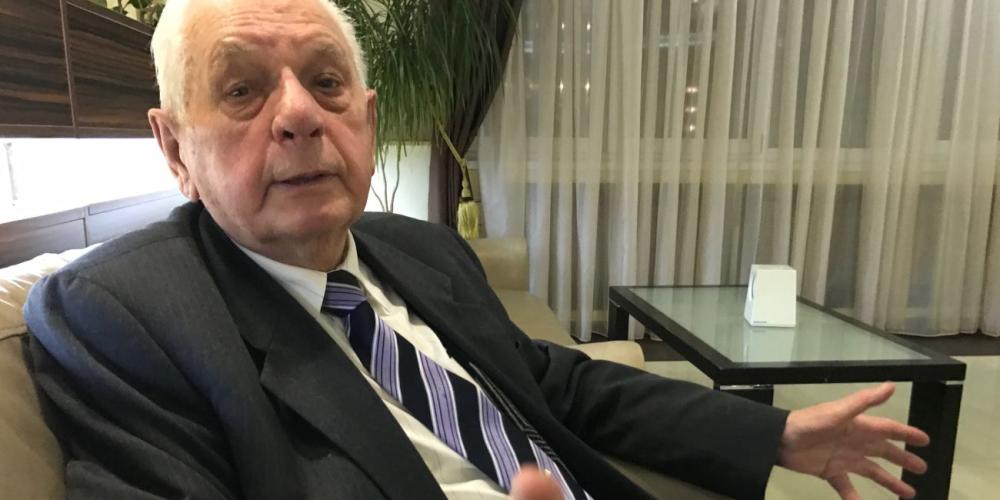From Soviet Prison to Modern Train, a Ukrainian Shares Jesus Everywhere
Nikolai Zhukalyuk reflects on the secrets of his Christian walk.
Editor’s note: In a new series titled, "My Mission," Adventist Mission editor Andrew McChesney asks Seventh-day Adventists around the world how they pray, read the Bible, and witness — the three ingredients to a dynamic Christian life. Nikolai Zhukalyuk, 84, former president of the Seventh-day Adventist Church, sat down with Adventist Mission when he traveled to Ukraine's capital, Kiev, for a visit by Adventist world church president Ted N.C. Wilson and other church leaders last weekend.
Q: How do you pray?
A: I have a special prayer time every morning and evening with my wife of 64 years. I also kneel to pray before I begin translating the Bible every day. While I am translating, I often turn to God when things aren’t coming together, and He intervenes.
The Bible says, “Pray without ceasing” (1 Thessalonians 5:17, NKJV). That means we must be people who pray. When I wake up in the morning, my first thought is to thank God for awakening me to a new day. When I get out of bed, I thank God that I can still move my legs. As I leave the house, I say, “God, please go with me on my way. Keep me from all evil.” I pray about the traffic as I get into my car. Usually there are no traffic jams, and I immediately thank God that He has heard my prayer.
I always thank God when I see something to be grateful for. Whenever I see something that doesn’t seem quite right, I pray for help.
Some people may say that God shouldn’t be bothered with small things. But I tell God about everything because He says, “I am with you always” (Matthew 28:20).
Q: How do you read the Bible?
A: I read the Bible a lot these days because it’s my work. But I always have tried to immerse myself in the Bible every morning. If I don’t have enough time in the morning, then I read the Bible in the evening. Spending time in God’s Word fills my mind with thoughts that I need for the day.
I understood the need to read the Bible daily when I was jailed for two years for my religious beliefs in Soviet times. I was 42 years old and didn’t have a Bible in prison in Lviv. I shared a prison cell with 35 inmates, and they were intrigued when they found out that I was a preacher. They were familiar with stealing and swindling, but they didn’t know anything about the crime of faith. These bandits and thieves asked me to tell them something from the Bible. I agreed on two conditions: that no one smoked or cursed while I spoke. The room had to be completely silent. Everyone had to listen.
When the room grew quiet, I began to tell the story of Creation. I spoke every day for a month. From memory, I told stories from the Old Testament. Reaching the New Testament, I spoke about Jesus’ birth, His parables, and His crucifixion. I ended with the New Earth and how Jesus will take away all pain.
I forgot parts of the Bible. But I was glad that I had read the Bible every day while I was free because many details returned to my mind as I spoke.
The inmates, who had nicknames for one another, called me “Holy Man.”

Q: How do you witness?
A: Being a Christian is not about talking the talk. Being a Christian is when people look at you and see that you have something that makes you different. Then they ask questions, and you can reply with enthusiasm because you know the Answer. But if no one asks you anything, then you have no reason to talk.
I look for ways to converse with people. I don’t think it is right to start a conversation by discussing the Sabbath or pork. Instead I want strangers to see that I have something that they need.
The other day, I boarded a train in Lviv for an overnight trip to Kiev. I reserved a bed in a two-person sleeping compartment, and the other passenger turned out to be a woman.
When we first met, I told her, “Let’s get acquainted. We are going to be traveling together for quite a few hours. Are you from Lviv, or were you in Lviv on business?”
The woman said, “I am not from Lviv. I am from Kiev, and I am going home.”
I said, “I am from Lviv and am traveling to Kiev.”
The woman kept the conversation going. “Why are you going to Kiev?” she said.
I told her that I am a former church leader and have many friends around the world. When my friends come to Ukraine, they sometimes invite me to meet them in Kiev if they can’t travel to Lviv. With this description, I provided a short biography of my life.
My words interested the woman. She said, “You know, my name is Nadya. Which church did you help to lead?”
I didn’t answer her immediately. Instead I asked, “Which church do you go to?”
“I don’t go to any church, but I consider myself Orthodox,” she said.
The woman said she works as a psychologist and specializes in treating people traumatized by the ongoing conflict in eastern Ukraine.
Then she said, “I understand that you aren’t an Orthodox believer. What is the difference between your church and the Orthodox Church?”
I said, “Orthodox believers worship on Sunday, and we worship on Saturday.”
“What do you mean that you worship on Saturday?”
“You need to read the Bible,” I said. “God’s law is in the Bible. Have you heard of it?”
“Yes, of course, I have.”
“Have you heard of the 10 commandments?”
“Yes. Don’t steal. Don’t kill.”
“Well, the fourth commandment talks about Saturday,” I said.
The conversation continued for a long time. I realized that we could talk all night, so I finally suggested that we get some sleep. The woman still wanted to know more, and she asked whether she could find any of my books in Kiev bookstores. I had mentioned during our conversation that I am the author of 15 books.
The woman expressed disappointment when I said the books were out of print, so I promised to mail her a book if she gave me her contact information. She wrote down her address and phone number.
When we arrived in Kiev the next morning, the woman introduced me to her husband, who was waiting at the train station. She helped carry my luggage into the train station’s waiting room and told me to call her if nobody arrived to pick me up.
“We’ll take care of you,” she said.
This is witnessing! Now I have a new soul who is interested in learning more, and I will continue to converse with her.





